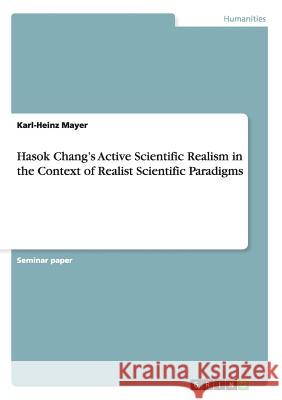Hasok Chang's Active Scientific Realism in the Context of Realist Scientific Paradigms » książka
Hasok Chang's Active Scientific Realism in the Context of Realist Scientific Paradigms
ISBN-13: 9783656655923 / Angielski / Miękka / 2014 / 24 str.
Seminar paper from the year 2013 in the subject Philosophy - Philosophy of the Present, grade: 1.0, University of Vienna (Institut fur Philosophie), course: Seminar Pluralismus und Wissenschaftsphilosophie, language: English, abstract: In his recent book, Is Water H2O?, Hasok Chang presents a detailed analysis of scientific realism and enunciates a new concept of it, which he names "active scientific realism." It is a view of scientific realism that accentuates experimental activity for learning about reality rather than armchair philosophy in the search for utmost metaphysical truth. Chang puts it in a nutshell as follows: "If the buzzword for standard realism is truth, it is progress for active realism." (Chang 2012, 223) This term paper attempts to critically look at this new concept, put it in the perspective of other realist concepts and find answers to questions like the following: - How does Chang's concept fit into the existing landscape of scientific realism? - What are the roots of the concept? - What is new and attractive in it? - What are the weaknesses of the concept? First I'll try to define scientific realism as a metaphysical and epistemological position as opposed to anti-realism. In the next chapter I'll present the main arguments for and against scientific realism, the "no miracle" argument and the "pessimistic meta induction," and also look at them from Hasok Chang's angle of view. Then a brief overview of common realist positions in philosophy of science will be given, including Hasok Chang's new conception. In the following chapter I'll try to look critically at some aspects of Chang's "Active Scientific Realism" and balance the strengths and weaknesses of the concept.











